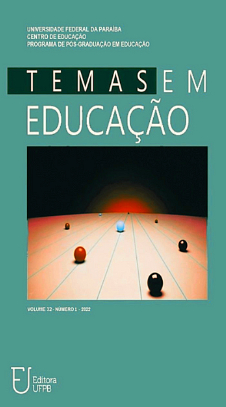THE LABYRINTHS OF THE THESIS AND THE FEAR OF DYEING WORDS: FORMATIVE NARRATIVES
narrativas formativas
DOI:
https://doi.org/10.22478/ufpb.2359-7003.2023v32n1.66629Keywords:
Thesis writing. Formative narratives. Postgraduate studies.Abstract
Writing is a complex and challenging activity, as there are countless difficulties between the researcher and what is being studied. Therefore, the objective of the study is to reflect on the challenges inherent in writing a doctoral thesis and the fear of writing in the postgraduate universe. The theoretical path undertaken here for analysis followed the assumptions of a qualitative approach. In this way, we carried out a bibliographical and narrative research. The constructed narratives are from a doctoral student in a Graduate Program in Education at a Federal Institute in Brazil. As a result, we deduced that the act of writing in graduate school is sinuous, but possible. Furthermore, these difficulties are even greater for women, who, in addition to academic activities, have to take care of the education of their children, household activities and professional life.Palavras-chave: Escrita da tese. Narrativas formativas. Pós-graduação.
Downloads
References
ADICHIE, Chimamanda Ngozi. Para educar crianças feministas: um manifesto. São Paulo: Companhia das Letras, 2017.
ALVES, Branca Moreira; PITANGUY. Jacqueline. O que é feminismo? Coleção primeiros passos. São Paulo: Brasiliense, 1982.
BEAUVOIR, Simone de. O segundo sexo: a experiência vivida. Rio de Janeiro: Nova Fronteira, 1980.
BOGDAN, Roberto C.; BIKLEN, Sari Knopp. Investigação qualitativa em educação: uma introdução à teoria e aos métodos. Portugal: Porto Editora, 1994.
CADORE, Marcelo. Bolsonarismo: uma história do conceito. 2021. 78 f. Monografia (Trabalho de Conclusão de Curso em Ciências Sociais). Universidade Federal da Paraíba. João Pessoa, 2021.
FREIRE, Paulo. Pedagogia da autonomia: saberes necessários à prática educativa. São Paulo: Paz e Terra, 1996.
FRIGOTTO, Gaudêncio. Educação como capital humano: uma teoria
mantenedora do senso comum. In: A produtividade da escola improdutiva.
São Paulo: Cortez, 4. ed, 1993, p.35-68.
JOSSO, Marie Christine. Experiência de vida e formação. 2. ed. Natal: EDUFRN, São
Paulo: Paulus, 2010.
LEHFELD, Neide Aparecida de Souza. Metodologia e conhecimento científico: horizontes virtuais. Petrópolis (RJ): Vozes, 2007.
LISBOA, Teresa Kleba. Gênero, feminismo e serviço social: encontro e desencontros ao longo da história da profissão. Rev. Katálysis. Florianópolis, v. 10, n. 1, p. 66-75, jan./jun. 2010. Disponível em https://www.scielo.br. Acesso em: 17 mar. 2023.
LISPECTOR, Clarice. Um sopro de vida: pulsações. Rio de Janeiro: Nova Fronteira, 1978.
LISPECTOR, Clarice. As palavras: nada têm a ver com as sensações, palavras são pedras duras e as sensações delicadíssimas, fugazes, extremas. Rio de Janeiro: Rocco Digital, 2014. E-book.
MARTÍN, Eloísa. Ler, escrever e publicar no mundo das ciências sociais. Revista Sociedade e Estado, v. 33, n. 3, p. 941-961, set./dez., 2018.
PEREIRA, Marcos Villela. A escrita acadêmica: do excesso ao razoável. Revista Brasileira de Educação, v. 18 n. 52, p. 213 – 244, jan./mar., 2013.
SANTOS, Boaventura de Sousa. Um discurso sobre as ciências. 5ª Ed. São Paulo: Cortez, 2008.
SEVERINO, Antônio Joaquim Severino. Metodologia do trabalho científico. São Paulo: Cortez, 2016.
SEVERINO, Antonio Joaquim. Pós-graduação e pesquisa: o processo de produção e de sistematização do conhecimento. Rev. Diálogo Educ., Curitiba, v. 9, n. 26, p. 13-27, jan./abr., 2009.
SILVA, Fabiane Ferreira da; RIBEIRO, Paula Regina Costa. Trajetórias de mulheres na ciência: “ser cientista” e “ser mulher”. Ciência e Educação, Bauru, v. 20, n. 2, p. 449-466, 2014. DOI: http://dx.doi.org/10.1590/1516-73132014000200012.
SILVA, Juliana Márcia Santos; CARDOSO, Vanessa Clemente; ABREU, Camila Eulálio; SILVA, Lívia Souza. A feminização do cuidado e a sobrecarga da mulher-mãe na pandemia. Revista Feminismos. vol.8, n.3, p. 149-161, set./dez., 2020.
Downloads
Published
How to Cite
Issue
Section
License
Copyright (c) 2023 Revista Temas em Educação

This work is licensed under a Creative Commons Attribution 4.0 International License.
Authors who publish in this journal agree to the following terms:
. Authors retain the copyright and grant the journal the right to first publication, with the work simultaneously licensed under the Licença Creative Commons Attribution that allows the sharing of the work with acknowledgment of authorship and initial publication in this magazine. . Authors are authorized to assume additional contracts separately, for non-exclusive distribution of the version of the work published in this journal (eg, publishing in institutional repository or as a book chapter), with acknowledgment of authorship and initial publication in this journal.
. Authors are permitted and encouraged to publish and distribute their work online (eg in institutional repositories or on their personal page) at any point before or during the editorial process, as this can generate productive changes, as well as increase impact and citation of the published work (See O Efeito do Acesso Livre).



















